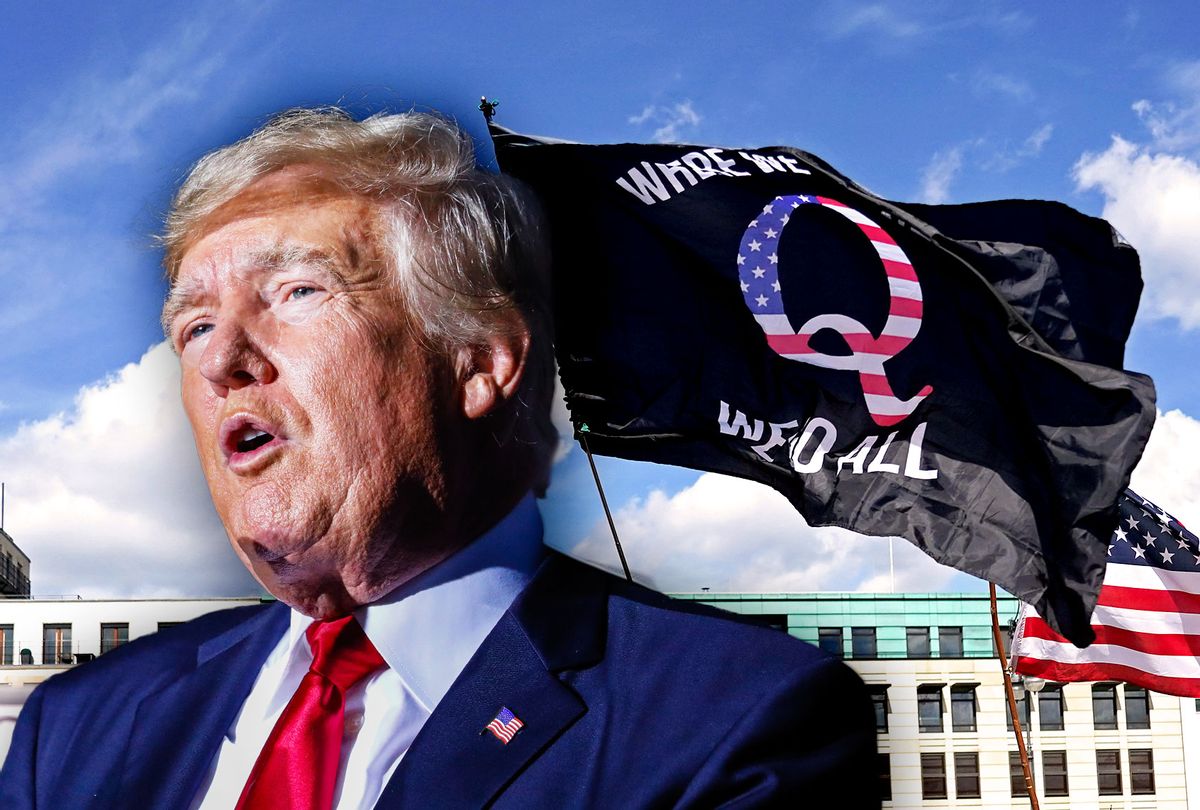In his one-term presidency, Donald Trump pushed out a number of notorious conspiracy theories tied to voter fraud, climate change and vaccines, but it wasn't until recently that Trump expressed his explicit support for QAnon – which promotes the idea that Trump is the savior of the American people.
Despite the dangers of endorsing a movement the FBI has labeled a domestic terror threat, Trump posted a picture of himself wearing a Q lapel pin, with the QAnon catchphrases "The Storm is Coming" and "WWG1WGA," on his Truth Social account earlier this week. He shared the post after an account called "Patriots in Control" originally published the photo on the platform.
His latest embrace of QAnon comes as no surprise since Trump spent much of his presidency praising followers who were a part of the movement and even endorsed a Republican candidate for congress who is a prominent QAnon supporter. He has previously defended the movement saying it consists of people who "basically believe in good government."
But what makes his recent endorsement especially disturbing is that it came hours after a man obsessed with the QAnon conspiracy theory allegedly killed his wife and seriously injured one of his children.
After Trump lost in the presidential election in 2020, Igor Lanis became obsessed with QAnon and the false idea that Joe Biden stole the election. His daughter, Rebecca Lanis, blamed her father's worsening mental health on extremism and conspiracy theories he encountered online, according to the Daily Beast.
Lanis represents just one example among thousands of other QAnon supporters who believe that Trump is fighting against a cabal of Democrats and other elites that are operating a global child sex trafficking ring. The narrative originated in 2017 after a YouTuber and two moderators from the 4chan website banded together, giving credibility to posts by a user called "Q", who claimed to be a high-ranking military officer. Eventually, the theory they espoused became known as Qanon.
In the years since, the movement has grown and become tied to a number of violent incidents, including the killing of two infants by their father, who told investigators that his belief in QAnon made him do it, a man ramming his pickup truck filled with guns through the gates of Canadian Prime Minister Justin Trudeau's home and the Jan. 6, 2021 attack on the Capitol.
And as social media platforms like Twitter have banned accounts linked to QAnon, the movement's supporters have shifted to Truth Social, which brands itself as a free-speech haven. Users have continued to post content that espouses violence and Trump has promoted these messages.
In the past, Trump has "re-Truthed" a post calling for "civil war" and pushing claims that the 2020 presidential election was a "coup," according to a report by NewsGuard. More recently, he has posted and reshared posts that included conspiracy theories about the Department of Justice, former President Barack Obama and Hillary Clinton, and also boosted QAnon accounts that attacked President Joe Biden and Vice President Kamala Harris.
Want a daily wrap-up of all the news and commentary Salon has to offer? Subscribe to our morning newsletter, Crash Course.
Trump's recent posting of his photo with the phrase "The Storm is Coming" days after the death of Queen Elizabeth II has led some QAnon supporters to believe that a "storm" really is coming. "The storm" refers to the day when Trump would ostensibly expose the pedophilic cabal of the deep state and the elites and also issue mass arrests of his political rivals. And as part of their role in this "Great Awakening", QAnon believers would educate the public about the movement ahead of these arrests. Ultimately, the "storm" would trigger their "savior" Trump's return to power.
The "storm" was originally supposed to strike when QAnon supporters marched on the Capitol on Jan. 6, but instead, the siege led to mass arrests and several QAnon believers losing faith after President Joe Biden was inaugurated. However, Trump's recent support of QAnon is enabling a QAnon renaissance, which poses the same dangers as the spread of disinformation on social media prior to the insurrection.



Shares